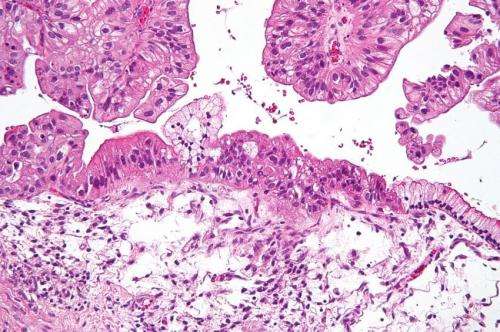Trametinib represents potential new standard-of-care for patients with recurrent low-grade serous ovarian carcinoma

A study led by researchers at The University of Texas MD Anderson Cancer Center reported that the MEK inhibitor trametinib reduced the risk of disease progression or death by 52% compared to standard-of-care therapies for the treatment of low-grade serous ovarian carcinoma. The findings were published today in The Lancet.
The international, multi-center Phase II/III trial led by David Gershenson, M.D., professor of Gynecologic Oncology & Reproductive Medicine, is the first positive randomized clinical trial of any therapy to demonstrate significantly increased progression-free survival (PFS) and objective response rate (ORR) in low-grade serous carcinoma, a rare and understudied form of ovarian cancer.
Median PFS for patients receiving trametinib was 13 months compared to 7.2 months in those receiving standard-of-care therapies. The ORR with trametinib was 26%, with 59% having stable disease for at least eight weeks. The median duration of response on trametinib and standard-of-care were 13.6 months and 5.9 months, respectively. Median overall survival was 37.6 months in the trametinib group and 29.2 months in the standard-of-care group.
"Previous treatment recommendations for patients with low-grade serous carcinoma were based on studies that focused on the more common high-grade serous carcinoma, despite the subtypes having distinct developmental pathways, molecular biology and clinical behaviors. Now we have encouraging data for this specific group of patients," Gershenson said. "The results from our study show trametinib should be considered a new standard-of-care option for women with progressive or relapsed low-grade serous carcinoma."
Low-grade serous carcinoma accounts for approximately 5% of all cases of epithelial ovarian cancer and is often diagnosed at a younger age in advanced stages, with a relapse rate of more than 70%. Frontline treatment typically consists of chemotherapy followed by aromatase inhibitor therapy. However, because this rare subtype is relatively resistant to platinum-based chemotherapy, finding an effective targeted therapy remains an unmet clinical need.
Trametinib emerged as a novel therapeutic approach for low-grade serous carcinoma due to a high prevalence of activating mutations in the MAPK signaling pathway, which includes the MEK protein. The drug is approved by the Food and Drug Administration for use in combination with BRAF inhibitor dabrafenib for a range of BRAFV600 mutation-positive cancers, including unresectable or metastatic melanoma, non-small-cell lung cancers and anaplastic thyroid cancer.
In the study, researchers enrolled and randomly assigned 260 patients 18 years or older with recurrent low-grade serous carcinoma of the ovary or peritoneum from 84 hospitals in the United States and United Kingdom between February 2014 and April 2018. Half received oral trametinib once daily, while the other half received one of five standard-of-care treatment options, including paclitaxel, pegylated liposomal doxorubicin, topotecan, letrozole or tamoxifen. The racial breakdown of participants was 229 White (88%), 9 Black or African American (3%), 7 Asian (3%), 1 Native Hawaiian or Pacific Islander (0.4%) and 14 undisclosed (5%), with a median age of 56.6 in the trametinib group and 55.3 in the standard-of-care group.
The most frequent grade 3 or 4 adverse events related to trametinib were skin rash (13%), anemia (13%), hypertension (12%), diarrhea (10%), nausea (9%) and fatigue (8%). In the standard-of-care group, the most frequent grade 3 or 4 adverse events were abdominal pain (17%), nausea (11%), anemia (10%) and vomiting (8%). No treatment-related death occurred.
Median PFS in patients in the standard-of-care group who crossed over to trametinib following disease progression was 10.8 months, and the ORR was 15%. Of the 66 standard-of-care patients who progressed or died after crossing over to trametinib, 43 (65%) had a longer time to disease progression on trametinib than they had on their preceding standard-of-care therapy.
"The findings associated with this trial are hypothesis-generating and provide important clues for future investigations," Gershenson said. "While the results of this study represent a major advance in the treatment of women with this rare ovarian and peritoneal cancer subtype, we need to accelerate our efforts toward the discovery of additional novel drugs or regimens. Ongoing trials include combinations of endocrine therapy and CDK 4/6 inhibitors and combinations of drugs directed at the MAPK signaling pathway plus other targeted agents."
More information: David M Gershenson et al, Trametinib versus standard of care in patients with recurrent low-grade serous ovarian cancer (GOG 281/LOGS): an international, randomised, open-label, multicentre, phase 2/3 trial, The Lancet (2022). DOI: 10.1016/S0140-6736(21)02175-9



















